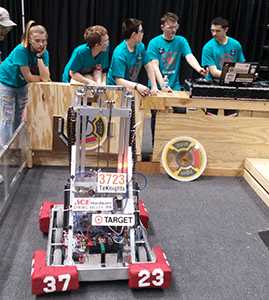Robotics clubs are popping up in local schools, and students are benefiting with skills that can take them beyond high school into the work force. The Kingsland school district started their club in 2011. The team is known as the TEKnights and is affiliated with FIRST (For Inspiration and Recognition of Science and Technology), an organization that works to create and nurture interest in STEM for kids from kindergarten through 12th grade. The TEKnights are in the 7th-12th grade division which is called FIRST Tech Challenge. Fifteen students are participating in the club this year.
Another FIRST affiliated club is run at Fillmore Central for students from 4th-8th grade in the LEGO League division. The club, called Team Trial and Error, is in its third year. Stuart Weist has been the coach for the last two years. “I enjoy watching the kids learn,” he said. Unlike the Tech Challenge division of FIRST which requires a minimum of 10 participants per team, LEGO League is restricted to just 10 members. Despite the differences in the age group divisions, the overall goals remain the same. “The goal of FIRST is to teach kids how to work together for a common purpose,” Weist explained. The philosophies of FIRST are Gracious Professionalism and Coopertition, a word which was coined to explain how teams should show kindness and cooperation with each other while competing. At competitions, teams are awarded points not just for their robot building, coding, and operating skills, but for how they treat their fellow competitors.
The Rushford-Peterson district also has a robotics club run through VEX, an organization similar to FIRST. The club is open to grades 7-12 and has 10 students participating, which is the number that the program recommends. The school had a robotics club last year, but this is their first year using VEX. The main goal of VEX is to encourage kids of all ages to learn STEM skills and put them to use. “Some of the benefits are that students learn programming languages, engineering practices, cooperation, and teamwork,” R-P Trojan Horses coach Mike Mulholland said. “Of course, they get to have fun building a robot too.”
While each of the three teams are currently at their optimal number of participants, there is room for growth as schools using either VEX or FIRST can have more than one team at competitions. Some of the Team Trial and Error members who will be moving up to ninth grade next year are also hoping to see a Tech Challenge club started at the high school level soon.
Both the VEX and FIRST programs have robotics competitions for teams to compete at a regional level all the way up to a world class level. The Kingsland TEKnights will be competing at the Seven Rivers Regional competition in La Crosse, Wis., in early April, and the R-P Trojan Horses have a competition coming up on February 1 in Whitehall, Wis. Fillmore Central’s Team Trial and Error is done competing for the year after making it all the way from regionals to sectionals in St. Paul on January 11.
While the robotics programs are different, they both focus on STEM. STEM, which stands for Science, Technology, Engineering, and Mathematics, provides skills and experience that will carry far into adulthood and are beneficial to a wide variety of careers. A common misconception is that robotics are about playing with LEGOs or building robots for fun, but it’s so much more than that. Students who participate in robotics clubs not only learn engineering, programming, and fabrication, but they also learn conflict resolution, collaboration, time management, critical thinking, how to interact with professionals, and more. “Students who join robotics club get a chance to develop a wide variety of skills,” TEKnights coach Ben Hanson said. “These skills will help the students down the road no matter what path they choose to follow in life.”




Leave a Reply